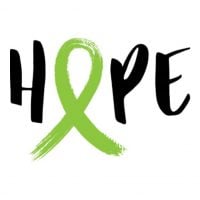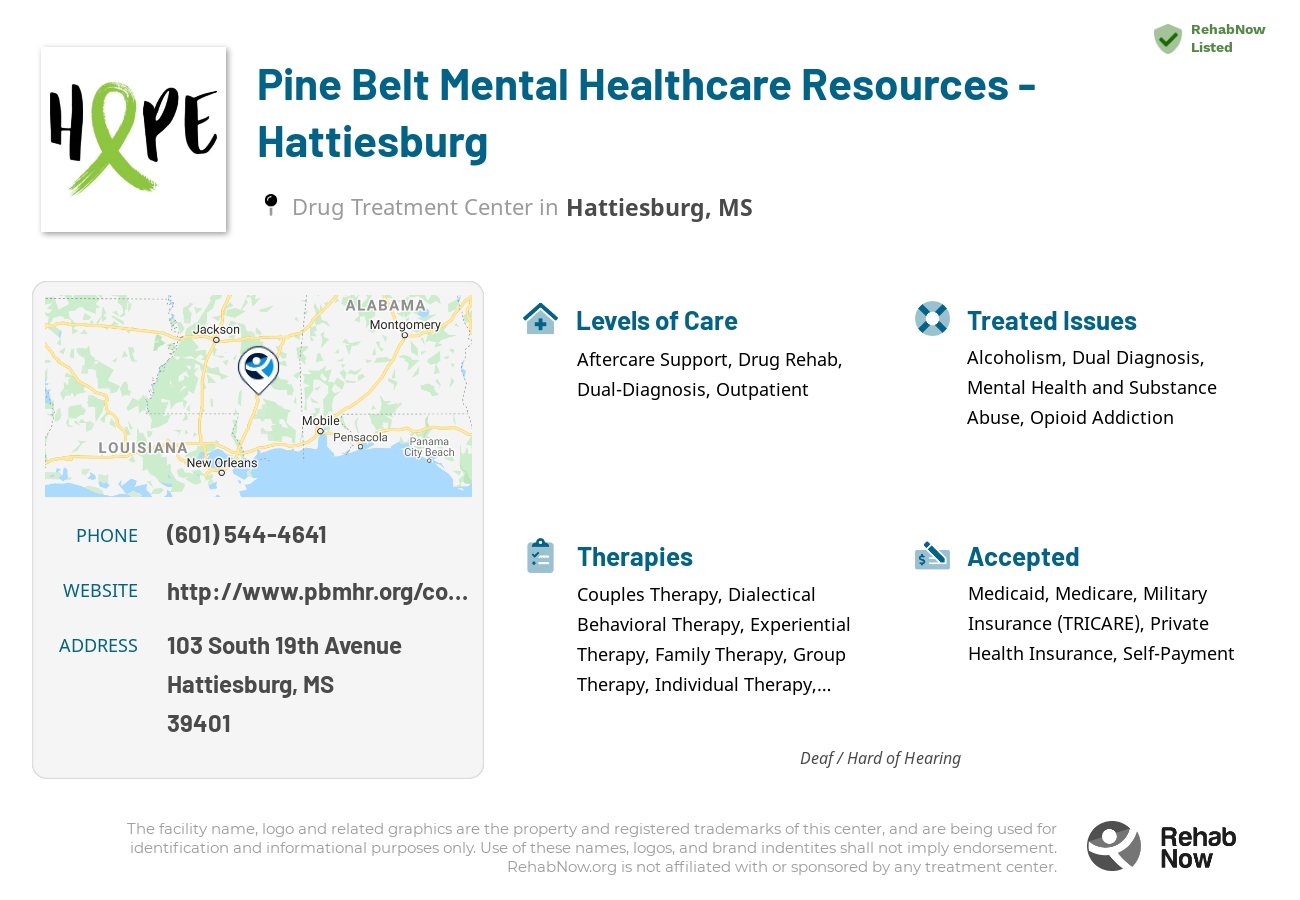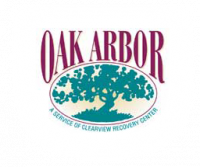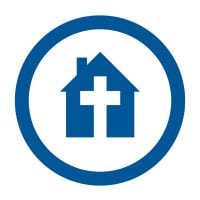Pine Belt Mental Healthcare Resources - Hattiesburg
Drug Rehab Center in Hattiesburg, Mississippi
Pine Belt Mental Healthcare Resources is a comprehensive mental health care and addiction treatment facility with a team of professional and licensed staff members who provide quality services to individuals who struggle with mental health issues and substance abuse in Hattiesburg, Mississippi.
About Pine Belt Mental Healthcare Resources - Hattiesburg in Mississippi
Located in Hattiesburg, Mississippi, Pine Belt Mental Healthcare Resources stands out for its comprehensive approach to addiction recovery. Catering to adults, including young adults and seniors, the facility is recognized for its specialized programs for individuals with co-occurring addiction and mental health issues. Pine Belt's dedication to creating highly personalized treatment plans, grounded in a 12-step approach, sets a standard for excellence in addiction care.
- Pine Belt offers both residential and outpatient services, ensuring a continuum of care that meets clients at their point of need.
- With a focus on individualized care, clients receive treatment plans tailored to their unique medical, mental health, and emotional requirements.
- Accredited by CARF and state-licensed, Pine Belt assures high-quality standards in addiction recovery and mental health services.
Accreditations from CARF and state licensing underscore the quality and reliability of Pine Belt Mental Healthcare Resources. Their treatment model emphasizes a holistic view, addressing each client's medical, mental health, social, emotional, and spiritual needs through a mix of traditional and innovative therapies.
Focusing on alcohol and drug abuse, dual diagnosis, and other mental health issues, Pine Belt employs a variety of treatment methods, including intensive counseling and life skills training. They offer both short and long-term residential care, as well as outpatient programs, adapting services to support clients throughout their recovery journey.
Genders
Ages
Modality
Additional
Accreditations
State License

CARF
The Commission on Accreditation of Rehabilitation Facilities (CARF) is a non-profit organization that specifically accredits rehab organizations. Founded in 1966, CARF's, mission is to help service providers like rehab facilities maintain high standards of care.
Conditions and Issues Treated
Opioid addiction is when someone becomes addicted to opioids. This can happen quickly due to any opioid use. Opioid withdrawal can be uncomfortable and lead the user to continue using even if they want to quit. It’s best to receive inpatient treatment for detoxification.
Even if a person doesn’t need inpatient treatment, it’s recommended to start rehabilitation or at least some kind of outpatient treatment. This is because the withdrawal symptoms from opioids can be uncomfortable and unpleasant, to the point that a person could end up using again or worse.
Detoxification should be done to break the physical addiction of opioids. This can be done with opioid replacement therapy, medication-assisted therapy, or a more traditional detoxification program. Intensive outpatient treatment is a form of addiction care that allows patients to continue living at home while undergoing treatment. This type of care is appropriate for patients who have been treated in residential treatment programs. Intensive outpatient programs include regular visits to the facility providing therapy, and patients gradually return to their routine life. IOP benefits most when patients have a supportive family member or friend to help them recover.
The first step to getting into an intensive outpatient program is to attend a detoxification facility. Detoxification facilities are designed to remove substances from the body safely. The patient will attend sessions designed to help them understand their addiction and its impact on their lives. While in an intensive outpatient program, therapy sessions are scheduled three to five times per week, with the patient attending no more than two sessions in one day.
Dual Diagnosis therapy is considered more successful than traditional rehab methods because it treats the addiction and the underlying mental health disorder simultaneously. This comprehensive approach gives Hattiesburg, MS patients the best chance for long-term recovery. If the patient does not receive treatment for both conditions, they are more likely to relapse.
Levels of Care Offered
This center offers a variety of custom treatment tailored to individual recovery. Currently available are Aftercare Support, Drug Rehab, Dual-Diagnosis, Outpatient, with additional therapies available as listed below.
Outpatient treatment consists of counseling and therapy sessions. The outpatient treatment process begins with the addict’s initial detox period, lasting about ten days. Outpatient treatment is used for those who are at moderate risk for “slipping back” into the addiction. It is also used for those who are not currently experiencing any side effects from withdrawal, can handle social pressure, have a stable living environment, and have a good support system.
Aftercare support is often overlooked in the treatment of drug and alcohol addiction. However, it’s an essential part and should be considered when planning a course of rehab.
Aftercare is a term that’s used to refer to any sort of continuing care offered for a drug addict who has voluntarily entered a rehabilitation program. This type of care can be provided in several settings, including outpatient therapy sessions after the addict has completed an inpatient program. There are also 12-step support groups, such as Alcoholics Anonymous, which can provide additional help for addicts trying to stay sober.
Aftercare is vital because addicts often face many challenges as they attempt to recover from drug addiction or alcoholism. Because of the powerful nature of these addictions, those who struggle with a drug or alcohol problem will likely have to face the craving for their substance of choice for the rest of their lives. Recovering can be a lonely and frustrating endeavor, especially without the support of others who are going through similar situations.
Therapies & Programs
Individual Therapy is a crucial component of addiction recovery. Therapists work with patients to identify the root of their addiction and figure out how to better handle the issues that led to them using drugs. Individual Therapy is one on one sessions where people meet with their therapist. Individual therapy provides a safe space for people to open up and discuss personal and sensitive topics which they may not feel comfortable discussing in a group setting.
In this type of therapy, therapists can develop specific solutions for each patient, which helps speed up their recovery process. In addiction recovery, therapy is a crucial part. It allows patients to go deep into their core issues and discover how those problems can be better handled now. Therapy can be performed in individual sessions as well as group settings. In individual therapy for addiction, the patient meets with the therapist one-on-one to focus on the underlying issues of addiction and come up with solutions to prevent future abuse.
Addiction can take a heavy toll on relationships, damage the trust and intimacy that was once there. Couples therapy at Pine Belt Mental Healthcare Resources - Hattiesburg helps to rebuild the trust and intimacy that has been damaged. An intimate relationship with a drug addict is not healthy for children or anyone in the family. Therapist help to rebalance family roles and create a healthier environment after rehab in Hattiesburg, MS.
Family therapy is a crucial part of drug treatment and getting sober. It is one of the most effective ways to help addicts stay on the path to long-term sobriety. One of the most important parts of family therapy is the relapse prevention plan. During treatment, therapists and doctors will often sit down with the addict and their family to develop a plan if the addict ever feels like they want to use again. This plan should involve steps the addict and family can take together to prevent them from relapsing in the future.
An addict’s family can play a vital part in helping them to avoid relapse because they can spot the warning signs and help them get back on track before it becomes too much of a problem. Family therapy is one of the most effective ways to help addicts stay on the path to long-term sobriety.
Group Therapy is employed by drug treatment centers like Pine Belt Mental Healthcare Resources - Hattiesburg to provide the recovering addict with a platform to talk about their feelings and experiences. It also provides for an opportunity to learn from other addicts who have successfully overcome their addiction. It is recommended that all group members be recovering addicts for this type of therapy to work.
This type of therapy involves the use of a variety of therapeutic techniques to help addicts recover from past traumas that might have triggered their substance abuse. During these sessions, therapists will work with the addict to address painful memories and learn how to cope effectively with stressors as they arise.
During these types of sessions, therapists will typically focus on three main goals:
- Identifying and expressing painful emotions associated with past traumas.
- Reducing the effects of stress on an addict’s life by developing more effective coping mechanisms.
- Developing healthy ways of thinking about stressful situations that can help addicts avoid substance abuse issues in the future.
This type of therapy is typically used in conjunction with other types of addiction treatment services. By identifying and dealing with the root cause of addiction, most addicts can overcome their cravings and prevent relapse once they leave rehab.
Many different types of addiction treatment services exist to help addicts safely get sober, but it’s important for recovering individuals to find a therapist or support group that will help them address the root cause of their addiction.
Dialectical behavior therapy (DBT) is a type of cognitive behavioral therapy that is focused on helping those with problematic behaviors caused by intense emotions and thoughts control and regulate their emotions and behavior.
Dialectic Behavior Therapy is beneficial for:
- People who have chronic suicidal thoughts and behaviors
- People who have chronic drug cravings
- People who have difficulty establishing and maintaining personal relationships
- People who have a mental disorder such as Borderline Personality Disorder
- People who have experienced trauma in their life
Cognitive Behavioral Therapy (CBT) is an approach and method in psychotherapy. Pine Belt Mental Healthcare Resources - Hattiesburg asks people to investigate how their thoughts, including habitual, harmful, and inaccurate ways of thinking, affect behaviors. CBT is based on the idea that rigid, inflexible ways of thinking cause people to have a limited ability to cope with stress, which leads to emotional distress.
Likewise, CBT helps people identify maladaptive behaviors and replace them with more positive behaviors. It makes you look at the way you perceive something and ask: Is this a realistic belief? CBT asks people to look at the role of behaviors and emotional responses and how they may be distressing in one’s life. The goal of CBT is to change the way people think and behave to achieve a more balanced, healthier lifestyle.
Moreover, CBT has been shown to reduce some types of anxiety disorders, depression, and symptoms related to thoughts or actions that are considered harmful.
Patient Experience
Experiential Therapy at Pine Belt Mental Healthcare Resources - Hattiesburg
Experiential therapy at Pine Belt Mental Healthcare Resources - Hattiesburg includes helping people work through emotional disorders by participating in events in real-time. It moves away from conventional talk therapy to discuss their concerns and emotions by making patients play roles or use props. It allows people to handle trauma and feelings healthily, reducing the need to resort to alcohol and substances in Hattiesburg, MS.
Payment Options Accepted
For specific insurance or payment methods please contact us.
Is your insurance accepted?
Ask an expert, call (888) 674-0062
Pine Belt Mental Health Resources Associated Centers
Discover treatment facilities under the same provider.
- Pine Belt Mental Healthcare Resources - Laurel in Laurel, MS
- Gulf Coast Mental Health Center - Venture House in Long Beach, MS
- Pine Belt Mental Healthcare Resources - Columbia in Columbia, MS
- Pine Belt Mental Health for Children - Hattiesburg in Hattiesburg, MS
- Pine Belt Mental Healthcare Resources - Ellisville in Ellisville, MS
Learn More About Pine Belt Mental Health Resources Centers
Additional Details
Specifics, location, and helpful extra information.
Hattiesburg, Mississippi 39401 Phone Number(601) 544-4641 Meta DetailsUpdated April 15, 2024
Staff Verified
Pine Belt Mental Healthcare Resources - Hattiesburg Patient Reviews
There are no reviews yet. Be the first one to write one.
Hattiesburg, Mississippi Addiction Information
Mississippi has one of the highest rates of drug and alcohol abuse-related deaths. Approximately 350,000 residents use illicit drugs every year while another 108,000 abuse alcohol. In one year, doctors in Mississippi prescribed 76.8 opioid prescriptions for every 100 persons. This compares to the national rate of 51.4 prescriptions.
Unfortunately, drug addiction in Hattiesburg, Mississippi, is widespread. According to recent statistics, over 1,000 reported drug abuse cases in the city in 2016 alone. From 2014 to 2016, the number of opioid prescriptions dispensed in Hattiesburg increased by 18%. A few different drug treatment options are available in Hattiesburg, Mississippi. These include inpatient and outpatient rehab facilities and 12-step programs and support groups.
Treatment in Nearby Cities
- Grenada, MS (171.5 mi.)
- Belden, MS (208.9 mi.)
- Etta, MS (217.6 mi.)
- Ocean Springs, MS (69.5 mi.)
- Tutwiler, MS (197.1 mi.)
Centers near Pine Belt Mental Healthcare Resources - Hattiesburg
The facility name, logo and brand are the property and registered trademarks of Pine Belt Mental Healthcare Resources - Hattiesburg, and are being used for identification and informational purposes only. Use of these names, logos and brands shall not imply endorsement. RehabNow.org is not affiliated with or sponsored by Pine Belt Mental Healthcare Resources - Hattiesburg.










